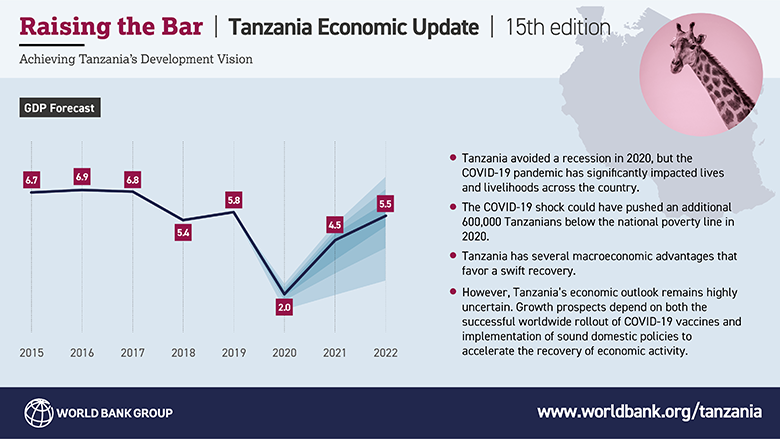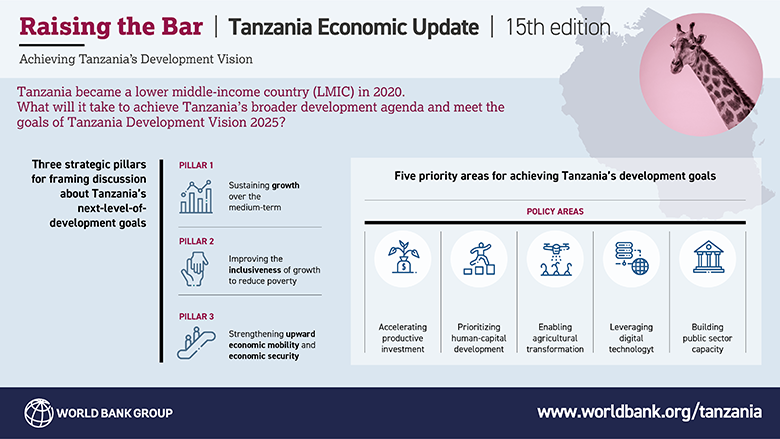DAR ES SALAAM, March 3, 2021 – In July 2020, Tanzania reached a remarkable milestone toward the objectives set in the country’s own Tanzania Development Vision (TDV) 2025 by achieving lower middle-income country status. This was the result of two decades of sustained growth and investment supported by stable macroeconomic conditions, rich natural endowments, and the country’s strategic geographical position.
The latest World Bank Economic Update, Raising the Bar: Achieving Tanzania’s Development Vision, argues that this achievement is an opportunity for the country to assess the quality of past growth in delivering broad welfare gains and to develop a roadmap to guide its further transition to a successful middle-income economy with a high level of human capital development, high-quality livelihood opportunities, and broad gains in living standards, as outlined in TDV 2025.
The report frames Tanzania’s ‘next leap’ of development around three strategic pillars: sustaining robust medium-term growth in a challenging external environment, improving the inclusiveness of growth and its impact on poverty reduction, and fostering upward economic mobility and strengthening economic security. These three pillars reflect both the lessons of international experience and Tanzania’s unique circumstances and form the basis for an actionable policy agenda to achieve the goals of the TDV 2025. This strategic framing is also timely as the country prepares its next Five-Year Development Plan.
The report highlights that what got Tanzania to LMIC status will not be enough to reach its ambitious middle-income goals. It will require a concerted effort to restore the economy’s growth momentum from the COVID-induced slowdown while expanding access to economic opportunities. Private investment should be the driver of sustainable future growth, as Tanzania’s experience of the previous two decades have shown. The report notes the slowing of private investment growth in recent years and urges the government to accelerate current efforts to improve the business climate. The report also underscores the double challenge Tanzania is facing – attracting private investment and boosting productivity – and suggests that policies to accelerate the uptake of digital technologies can play an important role on both fronts and promote inclusive growth.
High population growth, slow and uneven job creation, low levels of education and limited access to educational and employment opportunities, especially among women and girls, have hindered the inclusiveness of economic growth, blunting its effect on poverty reduction and the expansion of the middle class. The current economic expansion has been driven by sectors that employ relatively few workers, especially from poor households. Wealthier Tanzanians, particularly those in urban households with greater human capital and productive assets, were better positioned to seize opportunities generated by economic growth, and the imbalance in economic opportunity widened the income gap between households. Meanwhile, job creation is becoming increasingly urgent, as Tanzania’s population growth is intensifying pressure on the labor market.
“Human capital investments enable households at all income levels to access economic opportunities and benefit from growth, and this is critical for breaking the lack of intergenerational mobility to more employment opportunities and moving to more productive economic sectors,” write the report authors.
Based on Tanzania’s unique opportunities and challenges, and incorporating lessons from the experience of successful LMICs, this report highlights five priority areas for making progress across the strategic pillars described above. They are:
- Accelerating productive investment: The highest priority reforms relate to investor protection and retention, including managing the legal risks associated with the transition away from investor-state dispute settlement and setting up a strong, transparent and accessible grievance redress mechanism that de-escalates investor concerns before they become disputes or exits. Other priority reforms include articulating a clear investment strategy that not only goes beyond the extractives sector and improving the overall regulatory environment to unlock export-oriented investments.
- Prioritizing human-capital development: A more ambitious human capital development strategy is needed that reflects the evolving needs of Tanzania’s growing population, focusing on the poor and underserved. Improved access to basic education and health services for women and adolescent girls could generate enormous social and economic benefits.
- Enabling agricultural transformation: Agricultural transformation can deliver results across all three pillars. Private sector incentives to investment in the sector have remained modest, largely due to an unfavorable regulatory environment.
- Leveraging digital technology: Major factors constraining private investment in ICT sector in Tanzania include underinvestment in backbone network infrastructure; lack of an effective Open Access Policy; constrained independence and low capacity of Tanzania Communications Regulatory Authority; and low levels of income, digital literacy and domestic market size. This is holding back progress in closing the country digital divide and leveraging digital technologies for inclusive growth.
- Building institutions and capabilities: The Tanzanian government has proved their commitment to macroeconomic stability, which needs to be maintained and strengthened, while making further efforts to boost domestic revenue mobilization, improve efficiency of public expenditures, and mobilize resources for development without jeopardizing fiscal sustainability.
Finally, the report provides an overarching message on the importance of accurate and transparent development data. The report says “investing in high quality granular data and facilitating their exchange within the government and between the government and other stakeholders, is critical. High quality development data is the foundation for meaningful policy-making, effective public service delivery, transparent accountability and increased economic activity through private sector growth, and thus, data have enormous potential in improving development outcomes in low- and middle-income countries.”



